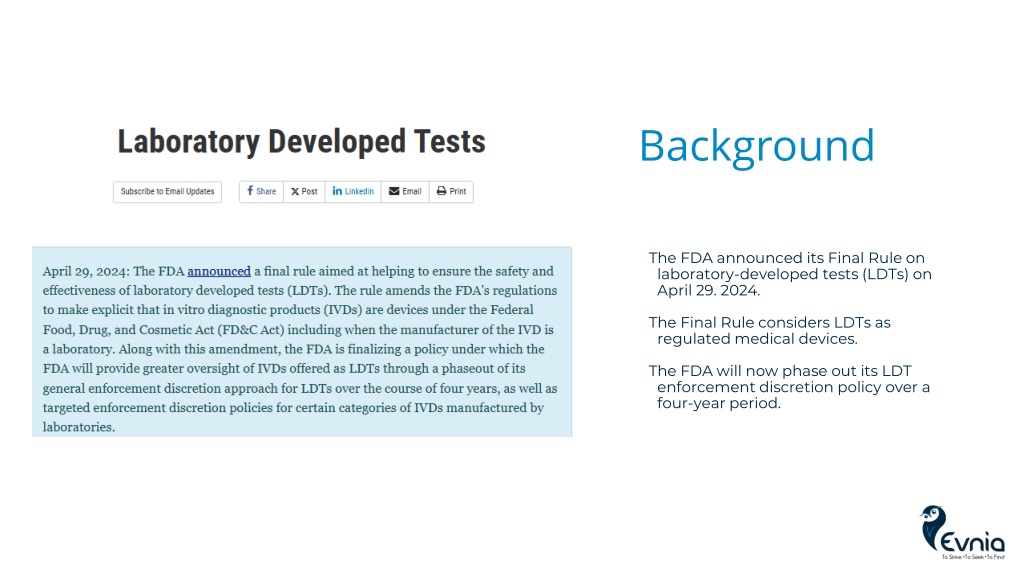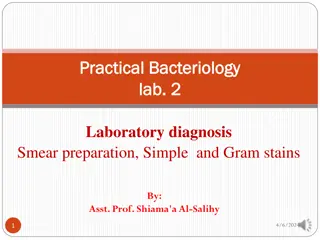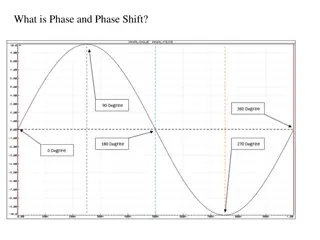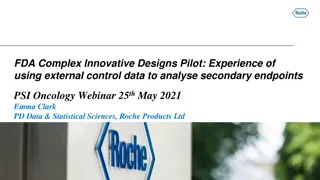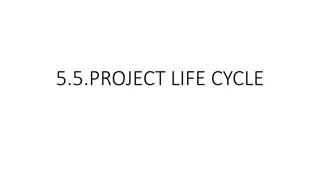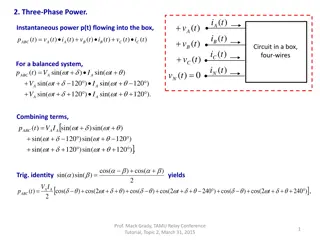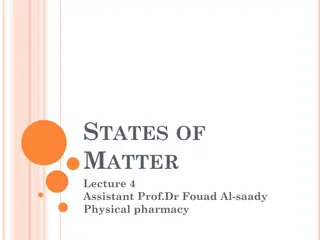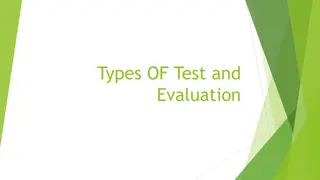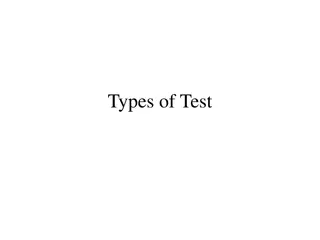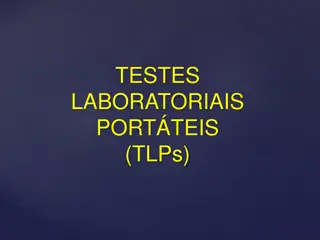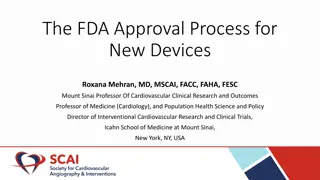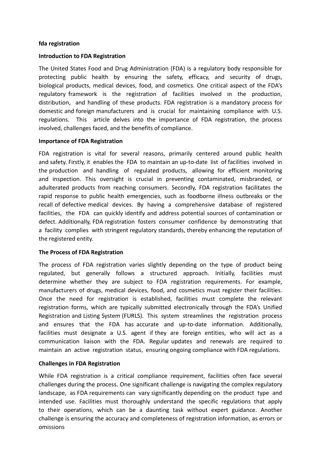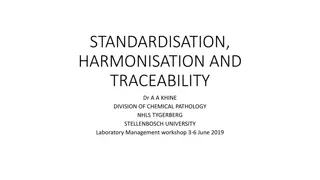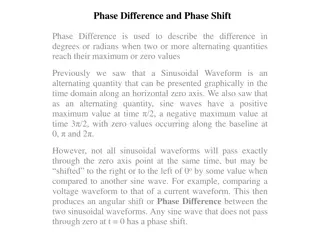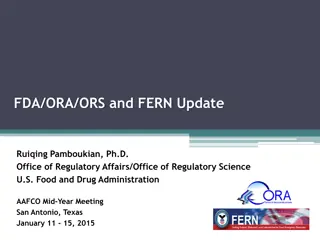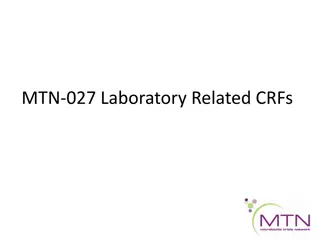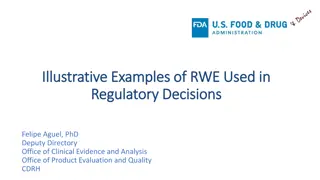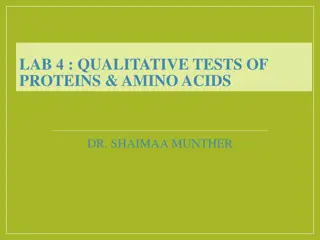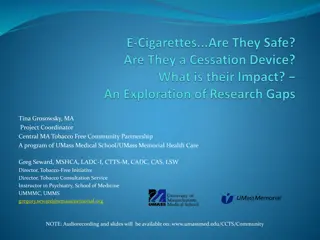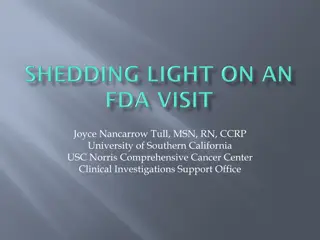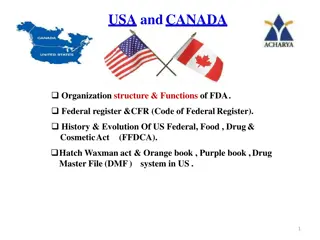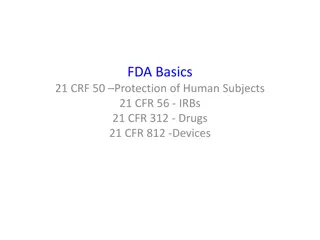FDA's Final Rule on Laboratory-Developed Tests (LDTs) and Phase-Out Policy
The FDA announced its Final Rule on laboratory-developed tests (LDTs), considering them as regulated medical devices. The phased-out policy will gradually enforce compliance with premarket review, quality system regulation, and other requirements over several stages. Additionally, a limited enforcement discretion policy will be applied for grandfathered LDTs that meet specific criteria.
Download Presentation

Please find below an Image/Link to download the presentation.
The content on the website is provided AS IS for your information and personal use only. It may not be sold, licensed, or shared on other websites without obtaining consent from the author. Download presentation by click this link. If you encounter any issues during the download, it is possible that the publisher has removed the file from their server.
E N D
Presentation Transcript
Background The FDA announced its Final Rule on laboratory-developed tests (LDTs) on April 29. 2024. The Final Rule considers LDTs as regulated medical devices. The FDA will now phase out its LDT enforcement discretion policy over a four-year period.
FDAs LDT PhaseOut Policy The phaseout program includes tests that qualify as LDTs per FDA s traditional definition (i.e., tests designed, manufactured, and used at a single Clinical Laboratory Improvement Amendments (CLIA)-certified laboratory location certified for high complexity testing) tests that were manufactured by high complexity, CLIA-certified labs and offered as LDTs by the lab. The phaseout program does not include Direct to consumer tests Tests intended for donor screening for blood or for human cells, tissues, and cellular and tissue-based products (HCT/Ps) Tests intended for emergency use per Section 564 of the Federal Food, Drug, and Cosmetic Act Tests manufactured or used outside of a clinical laboratory * The above tests do not qualify for LDT enforcement discretion and FDA continues to require these tests to fully meet the applicable requirements
FDAs LDT PhaseOut Policy 2026 Stage 2 2027 Stage 4 November 6: Compliance with premarket review requirements for high- risk LDTs unless a premarket submission has been submitted May 6: Compliance with establishment registration, device listing, labeling, and investigational use requirements 2027 Stage 3 2025 Stage 1 2028 Stage 5 May 6: Compliance with premarket review requirements for low and moderate-risk LDTs unless a premarket submission has been received May 6: Compliance with the quality system regulation (QSR) under 21 CFR 820, setting forth good manufacturing practices (other than the ones met at Stage 1 May 6: Compliance with requirements for medical device reporting (MDR), corrections and removals reporting, and complaint handling (21 CFR 820.198)
Grandfathered LDTs FDA will apply a limited enforcement discretion policy for LDTs that [ ] were first marketed prior to the date of issuance of the rule and that are not modified, or that are modified in certain limited ways [ ] These LDTs will not be required to comply with FDA s premarket review or QSR requirements, but regulatory requirements such as MDR, complaint handling, registration, and listing will apply. Laboratories offering pre-existing LDTs will need to submit labeling to FDA. Limited enforcement discretion policies will also apply for: 1976-Type LDTs (i.e., tests that have certain characteristics common among LDTs offered in 1976) LDTs approved by the New York State Department of Health s Clinical Laboratory Evaluation Program, LDTs manufactured and performed solely within the Veteran s Health Administration or US Department of Defense
How can Evnia help? Headquartered in Denmark, the company current has offices in the UK, Greece, Switzerland and Italy and is servicing life-science clients globally. It has been certified under ISO 9001:2015 as a Clinical and regulatory affairs consulting agency within the life science industry. Evnia offers a cluster of interconnected services from the early stages of an IVD s lifecycle until its post-market adulthood. We offer strategic counselling to IVD manufacturers and clinical laboratories to develop their regulatory and clinical strategy and bring novel technologies to market via the least burdensome FDA regulatory approach.
Regulatory Affairs Clinical Affairs Real World Evidence Representation Services Patient Treatment Real World Evidence
